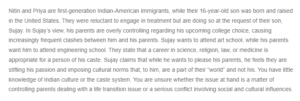Navigating Ethical Challenges in Cross-Cultural Counseling- A Case Study of Indian-American Cultural Considerations
Sound and quick decision-making are required to handle the complexities presented in the workplace. These decision-making processes may sometimes confer considerable ethical difficulties. Ethical issues occurring at workplaces have been implicated in reduced productivity and ultimate loss of profitability (Scheyvens, R., Nowak, B. & Scheyvens, H, 2016). It is, therefore, every organizational priority to ensure ethical issues are addressed. Various instances, however, occur at workplaces that require decisions to be made from two or more ethical options available. Such dilemmas often present considerable difficulties to organizational leaders, who have to make sound decisions amid these complexities. This paper seeks to analyze ethical issues presented in a case study and how these issues can be addressed.
The case study selected is case study #1. This case study depicts a 16-year son whose personal choice of college is in disharmony with his parent’s choice and that this disharmony is increasingly causing clashes between them. The ethical issues evident from this case study are between Sujay and his parents. The parents are trying to impose a critical life decision on him without his approval.
Sujay’s parents appear to be controlling and are trying to drive their son to a critical decision involving a life transition despite his obvious disapproval of him. Whereas Sujay’s parents’ decisions appear to be informed in part by some cultural alienations and beliefs, their subject appears not to be understanding this. According to them, particular professional fields remain preferable to an individual who belongs to their Indian culture. Sujay, on the other hand, claims to have little understanding of the cultural provisions of their Indian culture, having lived entirely in the US. He registers his disappointment with his parent’s controlling nature and even claims to be doing what they want just to make them happy.
Ethical issues drawn from the case study can adequately be addressed by a dialogue process that draws both parties involved. The dialogue process should be targeted at addressing issues such as enhancing Sujay’s satisfaction in his life decisions while avoiding the creation of unnecessary conflict with the parents. In this regard, the parents should be made to understand that Sujay is undergoing a critical transition stage in his life and that their support is needed. They should also be educated on the significance of allowing some degree of freedom to their son and, therefore, not interfere with his decisions unnecessarily.
Sujay should also be actively involved in these discussions. He should be made to understand his parents’ point of reasoning. He should be educated on the significance of cultural identification and the scope of decisions that are agreeable within the cultural constructs. The success of this dialogue process is dependent on the ability of both parties to compromise. A point of neutrality should, therefore, be sought that will ensure that Sujay doesn’t feel overcontrolled by his parents and, at the same time, the parents maintain the feeling of participation in their son’s life. In this case, the best scenario would be to allow Sujay to pursue the professional course of his choice so long as it is not forbidden in the Indian cultural construct.
Ethical codes of autonomy, veracity, and non-maleficence can all come into play in this discussion. Autonomy defines the ability to respect the rights and the opinions of a client (Stoll et al., 2020). Sujay’s parents should exhibit autonomy by respecting the opinions of their son. In this case, the parents should allow their son to pursue the course of his choice. Veracity defines the ability to pass accurate information (De Waegeneer et al., 2016). In this case, Sujay’s parents are obliged to give their son accurate information on their cultural requirements to prevent any conflicts that may be attributable to cross-cultural interactions as well as to maintain cultural identity.
Ethical issues exist in various social and economic constructs. The family is such a setting as depicted in the case study described above. The case study depicts a family that is undergoing ethical issues attributable to differences in opinion. The resolution of these issues requires a dialogue between the two parties. Ethical codes of autonomy and veracity should be applicable in this discussion.
References
De Waegeneer, E., Van De Sompele, J., & Willem, A. (2016). Ethical Codes in Sports Organizations: Classification Framework, Content Analysis, and the Influence of Content on Code Effectiveness. Journal Of Business Ethics, 136(3), 587-598. https://doi.org/10.1007/s10551-014-2531-y
Scheyvens, R., Nowak, B. & Scheyvens, H. (2016). Ethical issues. In Scheyvens, R., & Storey, D. (Eds.), Development fieldwork (pp. 140-166). SAGE Publications Ltd, https://www.doi.org/10.4135/9781849208864
Stoll, J., Müller, J., & Trachsel, M. (2020). Ethical Issues in Online Psychotherapy: A Narrative Review. Frontiers In Psychiatry, 10. https://doi.org/10.3389/
ORDER A PLAGIARISM-FREE PAPER HERE
We’ll write everything from scratch
Question
Review the case studies below before completing the Assignment.
Case Study #1
Nitin and Priya are first-generation Indian-American immigrants, while their 16-year-old son was born and raised in the United States. They were reluctant to engage in treatment but are doing so at the request of their son, Sujay. In Sujay’s view, his parents are overly controlling regarding his upcoming college choice, causing increasingly frequent clashes between him and his parents. Sujay wants to attend art school, while his parents want him to attend engineering school.

Navigating Ethical Challenges in Cross-Cultural Counseling- A Case Study of Indian-American Cultural Considerations
They state that a career in science, religion, law, or medicine is appropriate for a person of his caste. Sujay claims that while he wants to please his parents, he feels they are stifling his passion and imposing cultural norms that, to him, are a part of their “world” and not his. You have little knowledge of Indian culture or the caste system. You are unsure whether the issue at hand is a matter of controlling parents dealing with a life transition issue or a serious conflict involving social and cultural influences.

